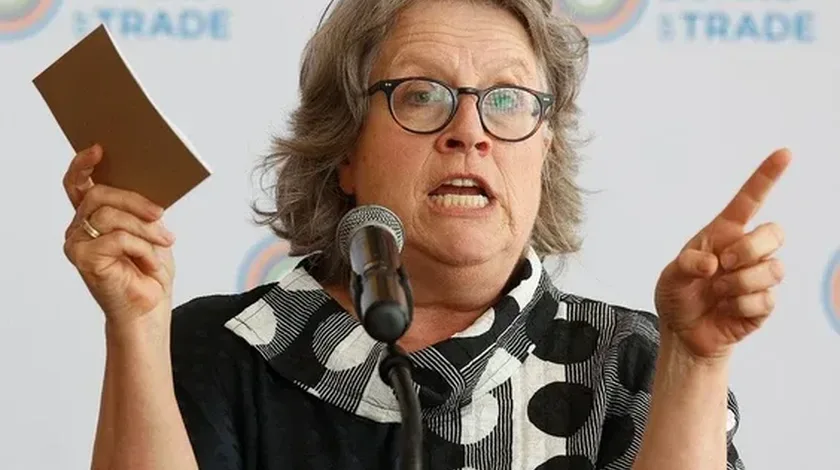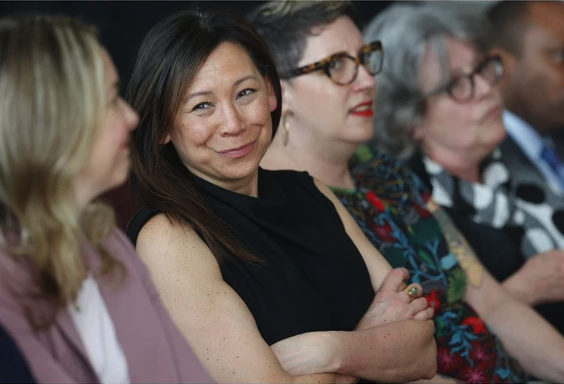Board of trade unveils 'action agenda' for downtown Ottawa

Mary Rowe, President & CEO, Canadian Urban Institute, outlines its report A Living Capital at Ottawa City Hall on Wednesday. PHOTO BY TONY CALDWELL /Postmedia
The action agenda, titled A Living Capital and produced in conjunction with the Canadian Urban Institute, lays out an ambitious 10-year plan.
The Ottawa Board of Trade launched its ambitious action agenda for downtown Ottawa on Wednesday with some ominous comparisons: New Orleans after the devastation of Hurricane Katrina, a boarded-up, post-industrial Detroit, even Chicago after its Great Fire of 1871.
“I don’t think we’re facing that kind of a catastrophe,” said Mayor Mark Sutcliffe, who cited the rebuilding of Chicago after the fire into the architectural wonder it is today.
“But we are facing a threat, and we are being called upon now as the leaders of this community to capitalize on that and turn it into an opportunity.”
The action agenda, titled A Living Capital and produced in conjunction with the Canadian Urban Institute, lays out an ambitious 10-year plan to attract 40,000 new residents into the city’s urban core, create 50,000 new jobs and calls for the creation of a $500-million investment fund from all levels of government and the business community.
You can read the report here.
It also urges the community to focus on what it calls “catalytic anchors” for the downtown, including the Sparks Street Mall and ByWard Market, a “business incubation district” and an arts and culture corridor.
It also urges immediate action on a number of seemingly intractable issues that plague Ottawa, such as homelessness, mental health supports and public transit. While those issues are ones normally in the purview of government, Sueling Ching, president and CEO of the Ottawa Board of Trade, says business has a role to play.

“It was the business leaders that made things happen,” said Sueling Ching, CEO of the Ottawa Board of Trade.
“It would be shocking to me that anyone who reads this report is surprised by it,” Ching said.
When the board of trade was founded 167 years ago, “it was the business leaders that made things happen,” she said. “So we feel that we are called upon today to support our elected officials to move our community forward in a positive way.”
She said the board is going to establish a “champions table” of business leaders who are willing to get involved and work with political leaders and other institutions and agencies to tackle the problems.
“By having a plan that everyone’s involved with, what we’re hoping for is some exponential movement or growth on some of these issues,” Ching said.
Like all cities, Ottawa took a gut punch from the COVID-19 pandemic. Transit ridership plummeted, federal employees began working from home (but beginning in the fall will be heading back into the office three days a week), and downtown restaurants and businesses suffered. On top of that, the federal government has begun shedding office space, leaving many downtown towers vacant.
The report estimates that the loss of federal tenants will cost Ottawa $66 million a year in payments in lieu of taxes. (Governments can’t tax each other, so the federal government makes the payments instead of paying property tax.)
If the city can add 40,000 more downtown residents, as the report suggests, it would bring in $120 million in new property taxes and boost spending and transit ridership. Attracting a million more tourists would add another $80 million in downtown spending, it says.
The report then lists some 60 actions to exploit Ottawa strengths and gives examples of other cities’ successes.
Ottawa, with its history and natural setting, is the envy of other cities in the country, said Mary Rowe, CEO of the Canadian Urban Institute, in a boosterish speech encouraging the city to sell its attractions to tourists and to bring more people downtown to live, work and play.
“When in doubt, add people,” she said.
Speaking to reporters afterward, Sutcliffe said he intended to meet with the board of trade to go over the report’s recommendations in more detail.
“What I’m seeing is a lot of energy. I see this as an opportunity to bring everyone together and to get everyone on the same page, including the other levels of government, to see this is a priority,” he said.
“There is a huge risk if we don’t do something. We don’t want to see boarded up windows in Ottawa. We don’t want empty stores and empty buildings. We want to have a vibrant downtown and it’s going to take everyone working together to make that happen.”
Source: Ottawa Citizen
Author: Blair Crawford

